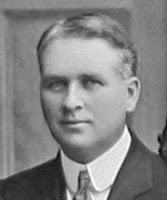 |
| Lorenzo Thomas. Family archives. |
Upon his return, he began work in a store in Eagle Rock (the town name changed not too long after that). Thomas showed immediate talent for the retail trade and became manager of the Zion's Co-operative Mercantile Institution (ZCMI) store in Rexburg at the age of twenty-two.
In 1895, Thomas was elected to the state House of Representatives, serving during the term of Governor William McConnell [blog, Sept 18]. That session of the legislature dealt with a wide range of issues vital to the young state. Early on, they worked out a reapportionment of the state Senatorial and Representative Districts, and restructured several counties in central Idaho.
The legislature also created several offices within the Executive branch. These included a Horticultural Inspector to oversee fruit grading and suppression of insect pests, and a Sheep Inspector to examine herds for possible infectious diseases. They also devised three amendments to the state Constitution. One amendment called for granting women the right to vote, a key milestone in women’s suffrage [blog, Nov 3].
Lorenzo so impressed leaders in Boise that he was appointed Deputy State Treasurer at the end of his term. Then, in rapid succession he became United States Commissioner and then Register of the Federal Land Office in Blackfoot.
Thomas was active in the LDS church, serving many years as a Bishop in Blackfoot. He also belonged to the Blackfoot Commercial Club, served as Director for several regional corporations, and rose to a captaincy in the Idaho National Guard. For a time, he acted as President of the Southeastern Idaho Fair Association.
 |
| Blackfoot, Idaho, ca 1898. Illustrated History photo. |
After ten years in the Land Office, Thomas retired to his law practice, interrupted by a term as a Probate Judge in Bingham County. He served as Blackfoot city attorney, and then was elected in 1915 to the first of his four terms in the Idaho Senate. He served two and two, with one term out of office between. During his final Senate term in 1921-1924, Thomas was selected as President Pro Tem.
Besides his political and legal activities, Lorenzo bolstered his farm holdings by supporting key irrigation ventures. Thus, the Idaho Statesman reported (February 15, 1919) that “Senator L. R. Thomas” and two others were trying to “interest the active support of the Pocatello Commercial Club” in an irrigation project in Bannock County.
Although he held no state public office after his final Senate term, he remained active in the Republican Party. As a sign of his commitment to service, Rotary International acknowledged Lorenzo as one of its three oldest District Governors … in 1939, when he was almost seventy years old. He passed away in July 1944.
| References: [Blue], [French], [Hawley], [Illust-State] |
| "Jottings from Convention Folk,"The Rotarian, Rotary International (August 1939). |